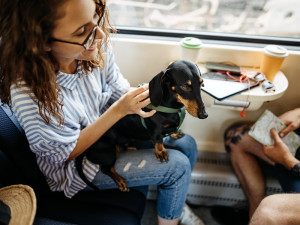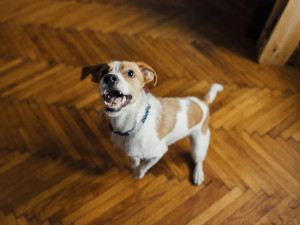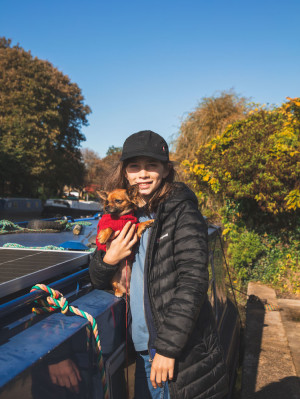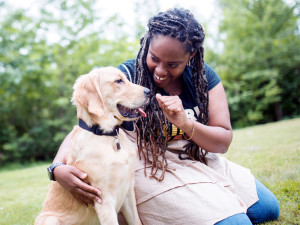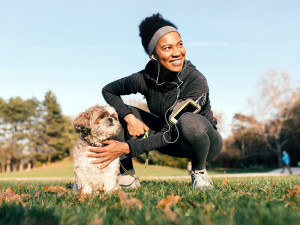10 Breeds of Dogs For City Living
Because taking a St Bernard on the tube is do-able, it's not the most practical
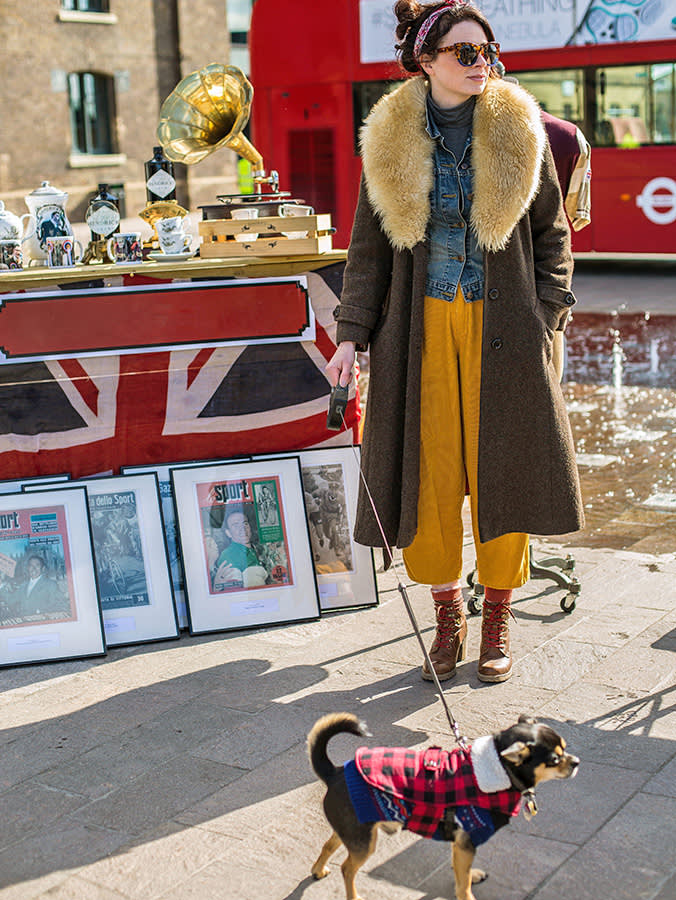
share article
Whether it’s navigating the tube in London, trotting down busy city streets or coming with you to the office, choosing a dog breed that will suit your fast-paced lifestyle and be comfortable in the hustle and bustle is an important consideration if you live in a city.
The share of householdsopens in a new tab with pets in the UK jumped from 41 percent in 2020 to 59 percent in 2021, and rose to an unprecedented high of 62 percent in 2022, likely attributed to more time spent at home during the pandemic. And with 84.4 percentopens in a new tab of the UK’s population living in urban areas in 2022 (the most recent data), that adds up to a lot of city-dwelling pups!
What does having a city dog entail?
Dogs who live with their pet parents in the city can live quite different lives to those who live in the countryside or more rural areas, and there are a few things to consider that will not only impact your dog’s day-to-day routine but should also be taken into account when choosing a breed to adopt.
Indoor space
Many people who live in cities will live in smaller spacesopens in a new tab than their rural counterparts, so having multi-dog households or a huge breed like a Saint Bernard in a flat is often not an option. Which is not to say that city living equals handbag pups only, but the amount of indoor space you have should be taken into consideration so you and your dog don’t get under each other’s feet... or paws.
Outdoor space
In the UK, one in eight householdsopens in a new tab (as of 2020) did not have access to a garden – and if you’re one of those people, you need to be prepared to actively and intentionally take your dog outside much more. This not only includes walks and exercise but also potentially taking your pup up and down the stairs of your flat every time they need the toilet (a particular consideration for puppies and dogs that are being housetrained).
Boredom
Speaking of space, it’s also important for city dwellers to consider the fact that their dog may not have the luxury of frolicking in a nice big garden all day long or enjoying the varied activities that living in a large house can offer. So plenty of playtimeopens in a new tab, mental and physical stimulation is key to keeping a city dog happy. If you’re also a 9-to-5 hustler, making sure you have a pup who can entertain themselves at home during the day while you WFH or come with you to the officeopens in a new tab and be happy to sleep under the desk and receive cuddles from coworkers is very important. Alternatively, ensuring you have the means to pay for dog walkers and doggie daycareopens in a new tab if you do have to leave them at home during the day is vital for their well-being.
Renting
Historically, people who rented properties (which is a lot of us millennials and gen z'ers struggling to get on the property ladder... if only we could curb our Netflix and avocado habits, right?) have had issues with landlords versus pets. But now, in response to the growing number of pet parents facing challenges in securing rental accommodations, the UK government is set to introduce significant changes to landlord and tenant rights with the Renters Reform Billopens in a new tab.
When the Renters Reform Billopens in a new tab comes into force (likely not until October 2024), consent for pets will become the default position under new legislation and landlords will no longer be able to serve a ‘blanket ban’ on pets. So while diplomatic discussions with your current or future landlord regarding dogs are still the order of the day for now and should be taken into account when deciding whether to adopt a pup, this should hopefully become a thing of the past in the not too distant future.
Barking
Unless you have the luxury of living in a detached property, you’ll also want to consider the fact your neighbours will probably be able to hear any barkingopens in a new tab that comes from your pup. Some dogs just bark less than others, and for the sake of your neighbour’s sanity, it’s worth being aware of this predisposed trait in some breeds.
How to take care of a dog in the city
Irrespective of whether you opt for a dog who needs minimal exercise or is a big ball of never-ending energy, ensuring your pup still gets plenty of exercise, walks, stimulation and opportunities to go to the toilet is vital when it comes to having a dog in the city.
Most dogs require at least one long walkopens in a new tab of a minimum of one hour a day, plus toilet breaks. Regular outings also provide mental stimulation: dogs are social creatures and they need to spend time with other dogs and people if you want them to live a balanced life. So whether that’s taking them with you to the pubopens in a new tab or getting them used to trips on busy public transportopens in a new tab, socialising and trainingopens in a new tab your dog to feel comfortable in all manner of city situations is key to a happy, healthy life for you and your pup.
While dogs are very adaptableopens in a new tab to their environment, there are some breeds that do better in the city than others. However, it’s important to remember that breed characteristics are generalised and each dog is an individual, so no matter what activity you’re doing with your dog, go at their pace and take your cues from their behaviour. Here’s a breakdown of some breeds that are likely to do particularly well in the city.
1. Dachshund
Dachshunds are really just couch potatoes (or couch sausages) who are happiest being around their person, which means they make great companions for city living. Bonus points for the fact you can carry them around in a dog bagopens in a new tab, too, which not only looks stylish on the streets but is also very convenient.
They also have one breed instinct that makes them uniquely suited for city living: rodent hunting. Dachshunds were originally bred to hunt badgers and rodents, so they will happily try to catch any mouse your landlord won’t. However, relative to their small size, Dachshunds have a deep, resonant barkopens in a new tab – and it’s one they like to employ frequently. Though early training can mitigate this breed instinct, it is unlikely to abolish it altogether, so keep this in mind if you live somewhere with lots of neighbours or particularly thin walls.
2. Yorkshire Terrier
Yorkshire Terriers are an often recommended city breed due to their petite size, adaptability and the fact they can often happily find entertainment indoors. However, like Dachshunds, Yorkies can be prone to barking. Unlike Dachshunds, their bark is a much more tolerable yap and therefore less likely to get you a noise complaint. Yorkies are also a good mix of energetic and low-key. A few quick laps around your one-bedroom and these pups will happily nap for the rest of the day – and their size means those laps are less likely to sound like a stampede of elephants to your downstairs neighbour.
Housebreakingopens in a new tab is the biggest issue with this breed, especially if you have to run down a few flights of stairs before you make it outside. The hard truth is that you might need to invest in some pee pads for these tiny pups and their even tinier bladders.
3. Cockapoo
Cockapoos, a cross between a Cocker Spaniel and a Poodle, are known for their friendly and outgoing personalities, which makes them great for all manner of city adventures, including taking them to the office. Top of the agenda for your team meeting hosted by CEO Cockapoo? Cuddles, tug of waropens in a new tab and fetchopens in a new tab.
Cockapoos are also intelligent, highly adaptable and easy to train. They’re a good midsize dog: small enough to fit comfortably on your lap but large enough to confidently strut the streets. Plus, their nickname, ‘the forever puppy’, speaks to their playful nature and youthful energy, meaning they’ll be able to keep up with your active lifestyle with ease.
4. Havanese
Also known as the ‘Velcro dog’, the Havanese is a small and cuddly breed that loves spending time with their people. Originally from Cuba, Havanese were bred as lap-dogs for aristocrats, but don’t let their fancy origins fool you – these pups are down-to-earth and love to have fun. They’re intelligent and loyal dogs who are known for their sweet dispositions and adventure-loving spirit – making them perfect for meeting new people and heading out into the city with you.
5. Italian Greyhound
Despite their small size (they weigh in at around 5kg, the same size as the average cat), Italian Greyhounds are balls of energy who will need regular access to a large green space so they have the opportunity to sprint around and burn off steam. Their teeny-tiny bladders also mean you should be prepared to take them out to the toilet very regularly, or alternatively accept the fact you’re going to have to create a dedicated pee corner in the house complete with puppy pads.
What truly makes Italian Greyhounds great city companions, though, is their gentle and affectionate nature – they thrive on bonding with their humans and will want to come everywhere with you. Once the zoomies have worn off, you can expect them to snuggle with you on the sofa or burrow under the covers as you sleep.
6. Maltese
This companion breed is charming, playful and full of confidence and personality, meaning they will quite happily adjust to living in the city. Known for their stunning floor-length white coat, the chic Maltese will turn heads on the city streets, which are also ideal places to walk them to avoid their glossy locks becoming muddy messes, as is the case with taking them on more rural walking routes. Either way, regular coat care and grooming is vital to prevent their fur from becoming matted and uncomfortable. One thing to also be aware of is that Maltese dogs make fantastic watchdogs, so they may have a tendency to bark at your neighbours.
7. English Bulldog
Expert loungers who can turn any cushioned space into a cosy haven, English Bulldogs have an easy-going nature that makes them very adaptable to various living situations, including small flats and city living. They don’t really bark unless absolutely necessary, which is good news for residents of flats who want a silly but chill dog who may or may not share the sofa with you. They have an unwavering determination (read: stubbornness), which can make them difficult to convince when it comes to taking them outside to places they’re not interested in going – but if they refuse, they’ll be more than happy to snooze all day and wait for you to get back for dinnertime. The ultimate oversized cuddle buddy, snuggling up to these chonks at night is a great way to keep your heating bill down.
8. Miniature Pinscher
Miniature Pinscher’s subvert any assumption that small dogs are shy or anxious; these little guys are confident, full of spirit and extroverted AF – meaning they can take on whatever city life throws at them. Trainingopens in a new tab for this breed is essential since they have a stubborn streak and tend to get a bit cocky, but once you’ve got them trained, they make excellent companions if you’re happy to take them out and about with you, as they need plenty of exercise and stimulation to tire them out. Less likely to lounge around in the office or on the sofa, Min Pins can still live happily in a flat if you give them daily walks and plenty of playtime (they’re very big on toys).
9. Corgi
Does it get any more British – or regal – than a Corgi? Loyal and loveable, Corgis, though not tiny, are well-suited to city life because of their manageable size and adaptable temperament. They really like to exercise and go for walks but also are perfectly happy to chill out inside, too. They like being around their people, which makes them great WFH companions, as long as you can take regular breaks for playtime, attention and a long lunchtime stroll.
Originally bred to herd cattle and sheep in Wales – their short legs allowed them to dodge kicks and keep up with the herd – Corgis have a history of working hard and taking cues from their pet parents. These days, Corgis are more likely to herd their humans around the house, so don’t be surprised if your Corgi tries to round you and your mates up for last orders at the pub.
10. Boston Terrier
Thanks to their compact size and easy-going nature, Boston Terriers are great for city living. Just as happy running alongside your bike as you cruise the back streets to work as they are snuggled up in your lap for the day, these tuxedo pups are equal parts adorable and sassy; they have playful, friendly personalities and are bundles of energy. When not making you laugh with their quirky behaviour, they love nothing more than cuddling up with their humans on the couch. These dogs are also eager to please and intelligent, which makes them easy to train – a great trait for first-time dog pet parents.

Ro Elfberg
Ro is The Wildest’s Senior Editor. She has previously written and copy-edited for British Vogue, Glamour and DICE. When she’s not being manipulated into dishing out Dreamies to Kobe the cat, she spends her free time trying to convince her snake, Butters, to wear a tiny hat.
Related articles
![kneeling woman with braids training her golden retriever]() opens in a new tab
opens in a new tabHow to Find the Right Trainer, No Matter What Your Dog’s Been Through
With so many dog trainers out there that it can be hard to know who you can actually trust (especially if your dog has trust issues of their own), here’s where to start…
![A dog running with a woman on a pier.]() opens in a new tab
opens in a new tab8 Questions to Ask Yourself When Choosing a Dog Breed
Find out which dog breed is right for your lifestyle
![woman in running gear petting a small dog in a park]() opens in a new tab
opens in a new tabWorkouts You Can Do With Your Dog – From Doga to Canicross
Walking is fun, but let’s kick things up a gear
![Two men look lovingly into each others' eyes while cradling a white dog]() opens in a new tab
opens in a new tabGetting a Puppy Is a Bigger Commitment Than Marriage, Brits Say
So-called ‘milestones’ are shifting these days. Is getting a dog the new getting hitched?
![A woman staring at her computer while holding her dog close.]() opens in a new tab
opens in a new tab10 Things to Consider Before Adopting a Pet
It’s a big decision, so tick these boxes before you sign on the dotted line
- opens in a new tab
Should You Kick Your Pet Out of the Room When You Have Sex?
And what to do if you and your partner can’t agree on whether you should have an audience
